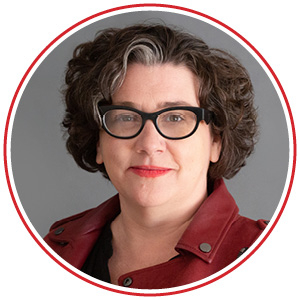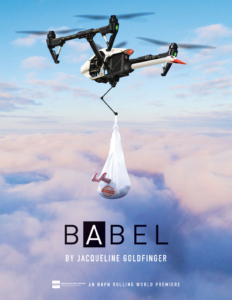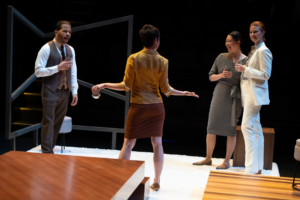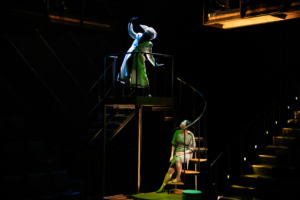PLAYWRIGHT INTERVIEWS
Interviews conducted and edited by Colin McGuire.
Love is perhaps the most demanding, ubiquitous and impossible idiom to confront within the confines of the written word. Jacqueline Goldfinger, however, has no fear, and in her latest production, Babel, she tells the story of two couples having trouble trying to get pregnant and the lengths to which they would both go in order to have a baby. Partially inspired by experiences in her own life, Goldfinger uses humor as a means to navigate the tricky subject matter, which even the director, herself, admitted was a mountain of a topic to climb. “It’s easier to digest scary things when we can also laugh about them,” she asserted in a recent interview that touched on everything from vulnerability in writing, to the recent Roe v. Wade Supreme Court decision, to the importance and necessity of finding love in most everything in life.
The following is the text of the conversation between CATF and Goldfinger:
Let’s start by talking about the play in a broad sense. It’s been labeled as a dark comedy and there’s two couples who are trying to get pregnant and I’m curious as to how you came up with this story and what inspired it.
My husband and I got pregnant and we had some friends who were having trouble getting pregnant. So, while the story isn’t our friendship, it’s kind of based on that experience of having your joy and then struggling with close friends who couldn’t achieve theirs for a while. They eventually did get pregnant and now they’re very happy. As we were going through this and going through the prenatal testing, we were trying to be respectful of our friends who were trying to get pregnant. Also, it’s looking at all the incredible testing that’s available now. We didn’t do all of it, but there’s genetic screening and genetic makeup and all these things we could know in advance, whether or not we wanted to. So, that put me on the track of writing this play. It’s about friendship and friendship when you’re grown up and going through difficulties. It’s also about the future of the reproductive technologies, which are very exciting, but they also hold the potential to be exploitative in ways that are not good.
Do you think on some level it’s scary?
On some level, it is scary, which is why I think it’s important that this is a comedy. It’s easier to digest scary things when we can also laugh about them.
Was it hard to get laughs out of a subject matter like this?
It was in early drafts. It was difficult, but as I excavated the story and the characters and they came more to life, I realized that because we had the face of the adult friendships, we could use that. One of the reasons you have friends as adults is that they make you laugh, hopefully. So, we were able to use the joy and laughter and love of those friendships to balance some of the more frightening elements with what I think is a really heartfelt, lovely, comedic story. Now, there are some serious moments in the play because I think there has to be. It’s a serious subject matter, but I do think one of the reasons this play has been so popular is that it strikes a nice balance between the comedy and the drama — just what life really is.
When did this play start to come together?
It came together pre-COVID, but then we had COVID. I’d been writing it for about two years and then I worked on it and workshopped it for two years. Then we had two productions right before COVID, but then we had to shut them down. This was originally slated for CATF in 2020.
Is this the official world premiere?
It is. It’s what’s called a Rolling World Premiere. In normal times, that means there are multiple world premiere productions all within one calendar year. That’s what it would have been if we didn’t have COVID. NNPN
Does a play like this, with everything that’s happened recently with the Supreme Court and Roe v. Wade — does that shine a new light on a play like this?
There is some connection there. It’s one of the reasons I set it in the near future, before Roe v. Wade was overturned. And also before Roe v. Wade was overturned, I had written the line, “I completely believe in a woman’s right to choose, the choice to make was settled long ago; this is about x, y and z.” So, I actually made that explicit in the play just because as important as the abortion debate is, I was trying to get us to look at a different aspect of reproductive rights. So, I set it in the near future and I also included that line. Unfortunately, that line did not come to pass in reality, but however, that line is still in there early on in the play because as I said, as important as those other conversations are, I think we also need to look at this element of reproduction separately because it’s really a different topic.
I had read somewhere that part of this play examines what it is people are willing to risk for love. Without giving too much away, how is that idea confronted in this play? Is this a matter of life and death? Are there other things in play?
I’d say it’s about the life and death of love. How much pressure can love take before the people can’t love each other anymore? I think there are high emotional stakes and that’s why the audience members become so invested. They want these characters to stay together and yet the audiences realize, I hope, that there’s only so much pressure love can take before it breaks, so where is that pressure point? Especially when it comes to children. Children, like it or not, have become the No.1 cause of divorce. Whether it’s the stress of having children, not being able to have children or the loss of children. So, that absolutely comes into play for our couples and it’s not about giving the right answer; it’s about being honest about the fact that love is beautiful but it can also turn dark and it asks, when is it not healthy anymore and when is it broken and when do you move on?
Do you think love can be beautiful when it’s dark?
Absolutely. But it doesn’t mean it’s good for you. There is something very attractive about the depth of the darkness, which becomes very intimate in love, but it doesn’t mean it’s healthy for you.
You mentioned how a personal story inspired this play. Is this one of the most personal plays you’ve ever written? Maybe is it the most personal?
I think it’s one of the most personal. I also wrote a play about my father and that one was very personal as well and that was a drama. But I think that and this one are two that came from personal experiences and personal emotions. It’s nice to be able … therapy is great, but I find that sometimes I don’t know what I’m thinking or feeling until I write about it. Once I write about it and I see my feelings on different characters on stage, that’s when I’m able to reflect on difficult things. I think these plays have given me the gift of being able to process and understand and reflect on very difficult issues in my personal life, which allows me to move on in a way that hopefully will make audiences laugh and cry and maybe even deal with some of the challenges in their own lives.
Is writing in a personal manner harder or easier for you?
I’m going to get a little technical for a minute but I think that writing personally, the first draft is easier because it’s something you need to get out. Whereas, when you’re writing a first draft for something that’s a little distant from you, that’s challenging because there’s research involved and all that. I would say in the revision process, the more personal stories are more difficult because that’s really when you have to work to push back from yourself and look at what’s right for the characters and what’s right for the play. You don’t totally disengage, but you have to have an element of distance. Whereas with original works, works that you’re researching, it’s just easier to get that distance.
Are you nervous about the play at all because you’re so attached to it? Are you nervous about how it will be received?
Oh, yeah. In my experience, when you write something that’s closer to you, it’s much more nerve-racking when it comes to how it’s received. However, I am so, so blessed that CATF came up with this incredible team that I could have never imagined to work on this with. It’s been so inspiring to work with them. I feel like they are bringing out the best in the play. So, whether or not people like it, I think we all brought our best to it, and that’s all you can really do in life.
Speaking of CATF, is this the first time you’ve been here?
I’ve been an audience member for years. I just live in Philly, so it’s just a four hour drive. I’ll come down and do a weekend pass, where I see everything from Friday to Sunday. So, when I was invited to actually have a show at CATF, my husband can tell you, I was jumping up and down. Then to be in the Marinoff space, which is a space that is absolutely divine. It has been one of the joys of my career to actually have a show at this festival.
The mantra for it has been thinktheater, so when it comes to Babel, and the notion of thinktheater, what is the underlying takeaway that you hope audiences get?
I hope that audiences get that no matter your political point of view, when policy affects your personal life, it takes on a whole new meaning. That’s a bigger picture view. I also hope they take away from the emotional and personal relationships that, as my grandmother would say, we are all unique butterflies and what works for one person does not work for another. How do you find the generosity to open your heart and home to people who may be different from you? But also, I want people to know that you have an opportunity to love deeply if you allow yourself to love.




